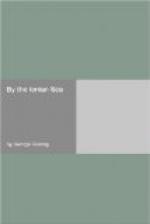Of course, no one looked at the permesso with which I presented myself at the entrance to the orchard. From a tumbling house, which we should call the lodge, came forth (after much shouting on my part) an aged woman, who laughed at the idea that she should be asked to read anything, and bade me walk wherever I liked. I strayed at pleasure, meeting only a lean dog, which ran fearfully away. The plantation was very picturesque; orange trees by no means occupied all the ground, but mingled with pomegranates and tamarisks and many evergreen shrubs of which I knew not the name; whilst here and there soared a magnificent stone pine. The walks were bordered with giant cactus, now and again so fantastic in their growth that I stood to wonder; and in an open space upon the bank of the Esaro (which stagnates through the orchard) rose a majestic palm, its leaves stirring heavily in the wind which swept above. Picturesque, abundantly; but these beautiful tree-names, which waft a perfume of romance, are like to convey a false impression to readers who have never seen the far south; it is natural to think of lovely nooks, where one might lie down to rest and dream; there comes a vision of soft turf under the golden-fruited boughs—“places of nestling green for poets made.” Alas! the soil is bare and lumpy as a ploughed field, and all the leafage that hangs low is thick with a clayey dust. One cannot rest or loiter or drowse; no spot in all the groves where by any possibility one could sit down. After rambling as long as I chose, I found that a view of the orchard from outside was more striking than the picture amid the trees themselves. Senza nulla toccare, I went my way.
CHAPTER VIII
FACES BY THE WAY
The wind could not roar itself out. Through the night it kept awaking me, and on the morrow I found a sea foamier than ever; impossible to reach the Colonna by boat, and almost so, I was assured, to make the journey by land in such weather as this. Perforce I waited.
A cloudless sky; broad sunshine, warm as in an English summer; but the roaring tramontana was disagreeably chill. No weather could be more perilous to health. The people of Cotrone, those few of them who did not stay at home or shelter in the porticoes, went about heavily cloaked, and I wondered at their ability to wear such garments under so hot a sun. Theoretically aware of the danger I was running, but, in fact, thinking little about it, I braved the wind and the sunshine all day long; my sketch-book gained by it, and my store of memories. First of all, I looked into the Cathedral, an ugly edifice, as uninteresting within as without. Like all the churches in Calabria, it is white-washed from door to altar, pillars no less than walls—a cold and depressing interior. I could see no picture of the least merit; one, a figure of Christ with hideous wounds, was well-nigh




